Yesterday was the first day of the third annual Notre Dame Religious Liberty Summit, which the Notre Dame Law School Religious Liberty Initiative is hosting this week at the Honourable Society of the Inner Temple in London.
The topics discussed were: treating religion as special, threats to religious and cultural sites, challenges and opportunities for religious expression, and the judicial tools of proportionality and strict scrutiny.
Recaps, quotes, and photos from yesterday can be found below.
TUESDAY, JULY 11
WELCOME ADDRESS HIGHLIGHTS
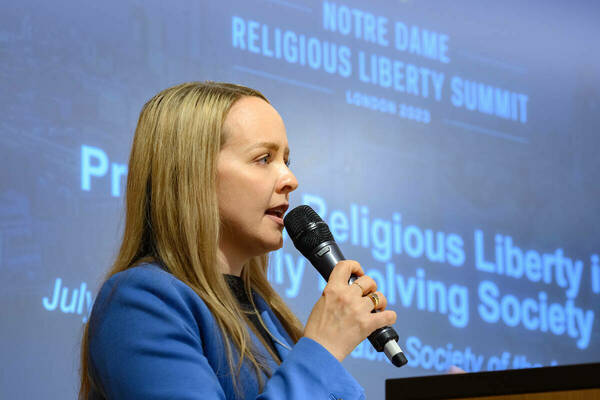
Welcome from Professor Stephanie Barclay
“This year’s summit addresses a wide variety of pressing issues related to freedom of religion or belief, from both an ecumenical perspective and within an academic paradigm. While some religious liberty issues are the same, there are new challenges, threats, and contexts to consider, such as social media and trends in the corporate space.”
Professor Stephanie Barclay
Faculty Director, Notre Dame Law School Religious Liberty Initiative
Welcome from Dean G. Marcus Cole
In his welcome remarks, Notre Dame Law School Dean G. Marcus Cole said the Religious Liberty Summit is a celebration — and there are many successes to celebrate — but those who advocate for freedom of religion or belief should be cautious about becoming complacent.
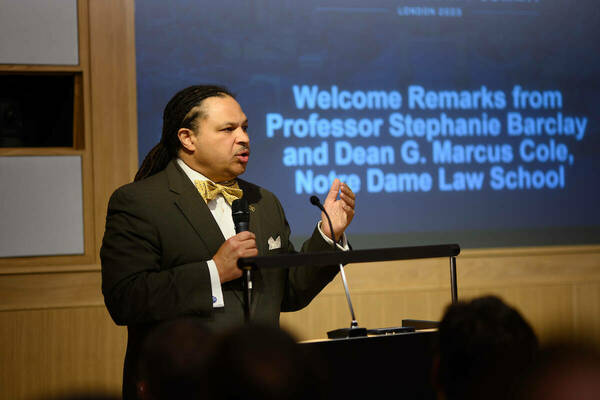
“Our victories, while impressive, have largely come in the courts of law. We must recognize that while these victories are important, they will be fleeting unless we also begin to win in the court of public opinion,” he said. “We must explain the importance of religious freedom to all people, and as the basis of all of our freedoms, if we are to persuade others as to why religious freedom needs protection.”
Dean Cole encouraged advocates of religious liberty to focus on people, not politics.
“By focusing on people, and the problems that people of faith can solve for them, we will educate the public and we will begin to win lasting victories in the court of public opinion,” he said. “That is where we have to have our focus.”
Read the full text of Dean Cole’s welcome speech.
PANEL 1
Justifications and Challenges for Treating Religion as Special
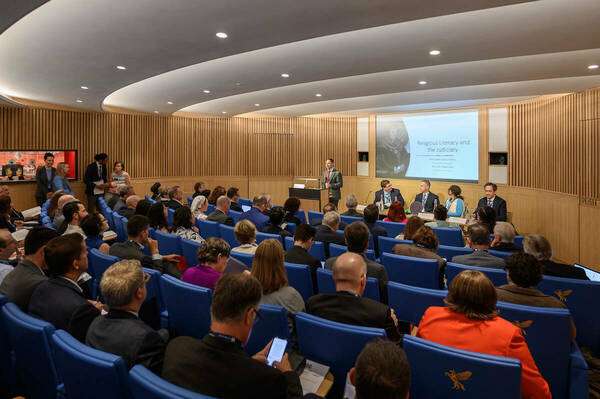
“However one feels about the merits of various exemption questions … the aspiration to ground the post-Christian American political establishment on the shifting sands of religious and other pluralism with the mechanism for enforcing that establishment being religious exemption is a failure.”
Professor Marc DeGirolami, St. John’s University School of Law
“Lack of understanding of the religious niche can lead to a very problematic and inconsistent treatment of claims in a religious context, which hurts everyone … and the legal framework as a whole, but also for faith groups.”
Professor Javier García Oliva, University of Manchester
“We are not here talking about religious communities wanting special freedom and not to be held accountable for actions that demand legal address. … We are asking for a rational system that takes into account the realities of the context of what is going on to ensure justice for all.”
Rev. Dr. Helen Hall, Nottingham Trent University and Church of England
“The Constitution singles out religion as special. ... Religion is specified in the text. ... Around the world this isn’t quite the case. … In more modern constitutions we see other phrases. … We see protections for religion or belief, but also very importantly, I think, we see explicit mention of rights of conscience. One question is if you were drafting to protect religion today … would you expand it to also include freedom of conscience?”
Professor Micah Schwartzman, University of Virginia School of Law
“Freedom of Religion or Belief (FoRB) makes the mistake of equating religious ideas and non-religious ideas. … When talking about non-religion or non-religious, it is better to focus on the non-coercion principle rather than making all ideas equal to all other ideas.”
Eric Rassbach, Becket Fund for Religious Liberty
PANEL 2
New Threats to Religious Cultural Heritage and Sacred Sites
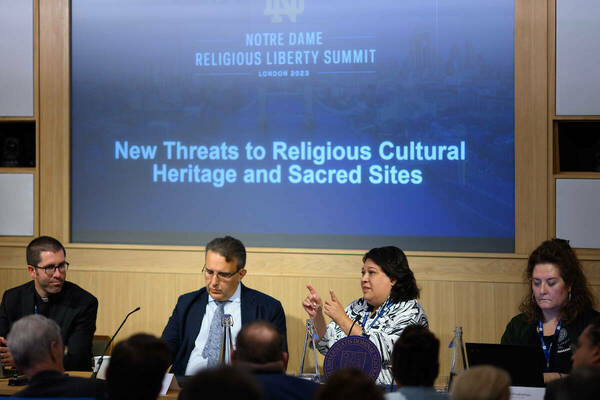
“Courts make judgments about religious property based on their own determination as to what counts as essential for faith communities’ free exercise of religion.”
Rev. Patrick Reidy, C.S.C., Notre Dame Law School
“Often, Indigenous people have to partner with a conservation interest to preserve their sacred site. More important than recreational value and its economic benefits is respect for other people.”
Professor Michalyn Steele, Brigham Young University J. Reuben Clark Law School
“The context of safeguarding religious cultural heritage has not been fully developed or implemented. ... To protect cultural heritage in general and religious cultural heritage in particular is linked to the Sustainable Development Goals in emphasizing diversity and inclusion, and the rule of law.”
Dr. Peter Petkoff, Oxford Journal of Law and Religion
“International human rights and international heritage law have been inadequate in recognizing religious liberty. Religious freedom initiatives are becoming more sophisticated and more impactful to help design religious heritage protections.”
Dr. Elizabeth Prodromou, Boston College, International Studies Program
PANEL 3
Social Media and Other Non-State Actors: Challenges and Opportunities for Religious Expression
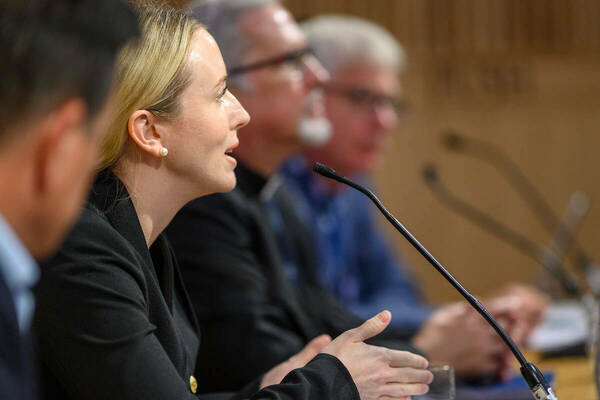
The third panel discussion centered on the theme “Social Media and Other Non-State Actors: Challenges and Opportunities for Religious Expression.”
The panelists included:
- Professor Joshua Kleinfeld, Northwestern University Pritzker School of Law
- Professor Michael McConnell, Stanford Law School
- Kelsey Zorzi, ADF International
- Rev. Philip Larrey, Pontifical Lateran University
- Moderator: Professor Paolo Carozza, Notre Dame Law School
Panelists considered how social media and its characteristics intersect with religious freedom while discussing social media’s potential to enhance religious pluralism and connections among people of different faiths.
Some panelists expressed concern that social media encourages a very atomistic form of individualism that, in many ways, is incompatible with the sense of belonging that religious communities nurture.
PANEL 4
Proportionality and Strict Scrutiny: Similarities, Differences, and Legitimacy of This Judicial Tool
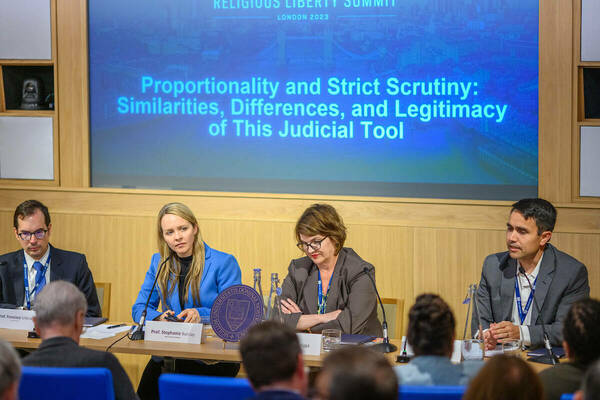
“Proportionality is the main tool in comparative constitutional law, used all around the world both in constitutional law and in international human rights law. The U.S. is often portrayed as an outlier, but recent scholarly works — such as Jamal Greene’s and Vicki Jackson’s — argue forcefully for its adoption in the U.S. as well.”
Professor Francisco Urbina, Notre Dame Law School
“Judicial decision making in complicated cases regarding religious symbols, garb, and women may be driven by disgust and impurity discourses. … These discourses are worthwhile to analyze systematically.”
Kristina Arriaga, Intrinsic Communications
“The best way to think about what it means to have a right against the government is that you have an inclusionary reason. The government can only interfere with a religious exercise for certain permitted reasons. Under strict scrutiny, they are pretty small and strong. Courts are now asking, is that in fact the reason? Is it necessary for the government to interfere with religious exercise to advance that reason?
Professor Stephanie Barclay, Notre Dame Law School
“The nominal tests that the court uses … the strict scrutiny test or proportionality test … are less significant than whether the test is used and applied in a defeasible or preparatory way.”
Dr. Justin Collings, Brigham Young University J. Reuben Clark Law School
EVENING ACTIVITIES
Evensong Service, Westminster Abbey Tour, Reception at Supreme Court of the United Kingdom
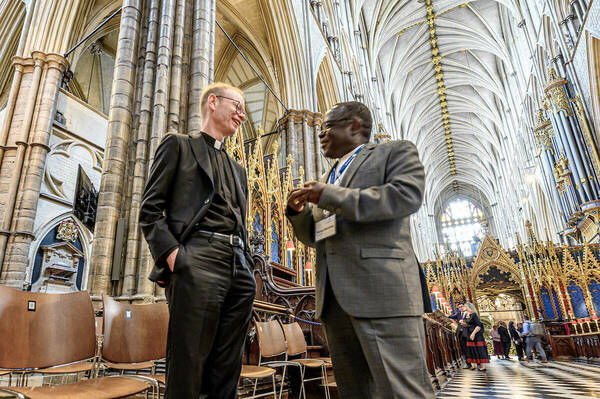
Last evening attendees participated in an Evensong service that included choral music from the rich Anglican musical tradition, scripture readings, and prayers.
Afterward attendees had a private tour of Westminster Abbey, and then attended a reception at the Supreme Court of the United Kingdom.
Read the other daily recaps from the 2023 Notre Dame Religious Liberty Summit: